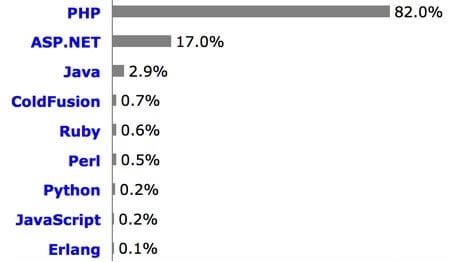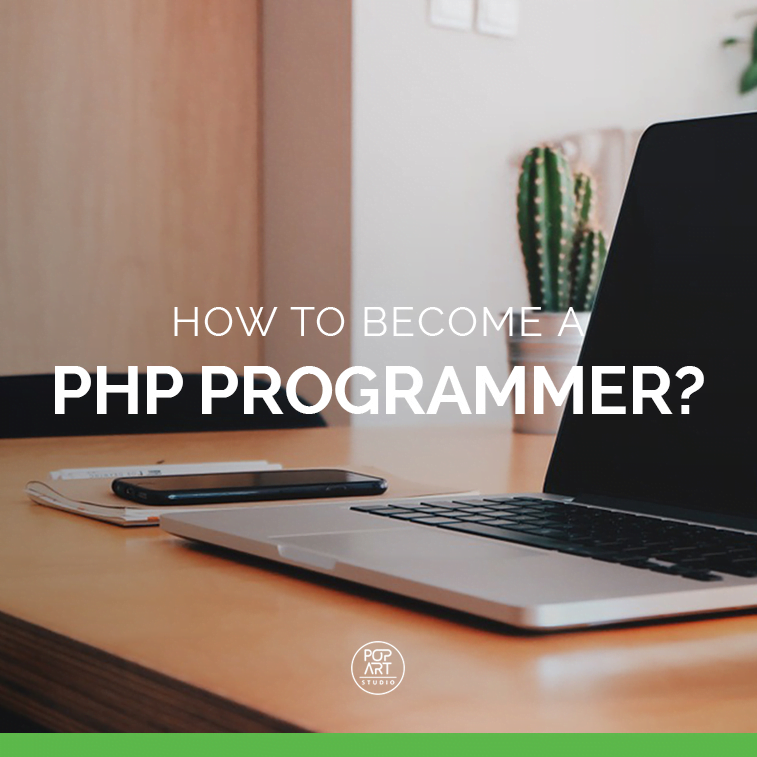Programming is one of the new professions that emerged in the contemporary, digital age, thus more and more people are learning programming languages. PHP is one of them.
In case you think it is not for you, you are wrong. Learning programming languages does not differ from learning any other skill or a job, but brings along many benefits in the long run. Here we offer you some guidelines on how to become a PHP programmer.
What is PHP?
PHP used to stand for Personal home page tool, but evolved into Hypertext preprocessor. It is one of the most popular programming languages in the world, and is also one of the most used ones in advertising, design, statups and small companies. Some of the most visited websites in the world, such as Facebook, Yahoo, Wikipedia, and WordPress, were written in PHP, which indicates the importance of this programming language today.

PHP is a server-side programming language initially meant for the creation of dynamic web pages, although it can be used to create graphic interfaces and console applications as well. It was initiated in 1995, but the language written that year does not have much to do with the current PHP. Since its official release in 1997 it got through many modifications. The latest update, version 7.0, was released but has not yet caught on because not all servers support it. PHP owes its popularity to the easy use and to the simple syntax of C programming language. PHP programming community at the moment gathers thousands of programmers worldwide.
The good side of PHP is its speed, whereas the bad side – its security vulnerabilities. It is supported by most operating systems, and if it does not come pre-installed, it is available for free download. It also supports numerous databases, some of which are MySQL, mSQL, PostgreSQL, SQLite, Sybase, ODBC, Oracle, Microsoft SQL, DB++ and dBase.
Required education
Depending on the industry you want to work in, different education is required.
Working in a firm usually requires university degree in areas such as information or computer sciences, software engineering or similar fields, but the practice confirms it does not have to be the case. On the other hand, freelancing and self-employment requires only self-paced learning. Sometimes, even, the degree matters the least, because your previous work experience or a solid portfolio speak for you louder than any degree, and the familiarity with or an expertise in another area can only be a plus.
Keeping up to date is always quintessential, thus reading old books will not suffice. Recent publications, up to 2 or 3 years back, on PHP v5.x, are acceptable, if accompanied with new reading material. Considering how fast and frequent are the changes in programming, the Internet, computer technologies and virtual community in general, the best source of fresh information is the Internet itself, as the publishing industry lags behind. Find trustworthy blogs and active forums, PHP thematic websites, follow discussions, leave comments and exchange information with others, as that is how you can stay in touch and contribute to the wider community. Meetups are another way for that, plus you get to see people face to face and exchange experiences with them – ask around to see if there are any meetups in your area and get in touch with them.
Another good learning method that is gaining more popularity are mass open online courses – MOOCs. Majority of the best universities in the world launched their own MOOC platforms and offer a plethora of courses, providing even certificates or degrees for a humble tuition fee.
Where to Start?
Ubuntu / Windows / Mac
Operating systems in use today significantly vary from one another, so it is best to decide in which you want to start programming. Our suggestion is to install a virtual machine into your OS and use Ubuntu system in it, because its runtime environment resembles the one in PHP. Of course, familiarity with other systems is only a plus.
CMS or framework
PHP is used in many platforms, thus it is not easy to decide for one or two to get specialized in. To see which platforms are the most demanded ones, always go through online employment websites first. That way you get to see the demand and the supply in the work market, as well as who are your competitors.
Platform popularity is a good indicator: the more popular, the easier to use, but also: the more competitors. On the other hand, less popular platforms mean they are more difficult to use, which also discourages great competition.
The most popular content management platforms, CMS, are WordPress, Drupal, and Joomla; and if you go for framework, there are Laravel, Symfony, Zend, YII, Silex, Slim, CakePHP, auraphp, Phalcon. The final decision is always up to you, so be wise to ensure your programming future.
Once you start working…
…do not expect to learn PHP programming in just a couple of days or a week. It takes a lot more time than that, sometimes even months. Bear in mind it is not a process in which you can make clear cuts and say “I will do programming today, learn databases tomorrow, do programming overmorrow, then learn about CMS, then do programming again.” It is more likely you will be doing many things at once: encountering dilemmas and problems while programming means you will be solving them on the way. It is only to say you will be learning new things all the time.
It is best to start small. Think about something real and try to present it in code. Go through basic tutorials on PHP and gradually move on to the more advanced ones. Before you start learning about the advanced functions, you need to know the basics. That is why it is necessary to know HTML and CSS prior to working with PHP, as they are closely related. Sometimes, courses on PHP also include CSS and HTML before starting with PHP.
Whenever you get the chance, try dissecting existing projects by studying their codes. It is easy to find a project online, paste it into your computer and modify the code, so as to see the changes it causes in the programme. Go slowly through each file and each line of the code – it will help you understand the codes.
When looking for projects, go for the latest ones – simply because it is more likely they were written in the latest update of PHP. Familiarity with the basics of the older versions is fine, but what you need are the latest updates.
It is sometimes very tiring investing both time and effort into the unknown, without any warranties, but we should be persistent and never give up. Learning how to do programming will definitely pay off at some point, and the sooner you start learning the greater are your chances of succeeding in finding a desired employment. If programming is what you truly like, then working in the field means that your hobby will turn into a job that you do with ease and enjoyment, and that is the best way possible for a job.
Interested in programming? Read this as well:





